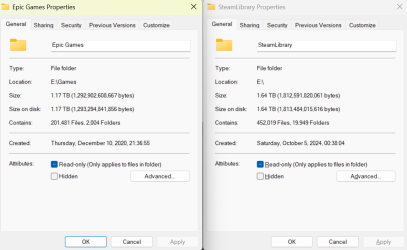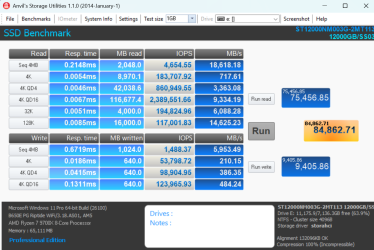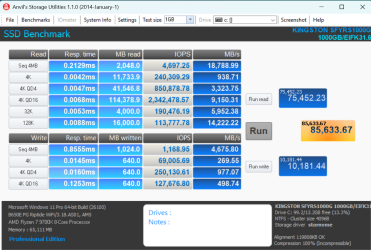- Joined
- Feb 22, 2016
- Messages
- 2,426 (0.71/day)
| Processor | Intel i5 8400 |
|---|---|
| Motherboard | Asus Prime H370M-Plus/CSM |
| Cooling | Scythe Big Shuriken & Noctua NF-A15 HS-PWM chromax.black.swap |
| Memory | 8GB Crucial Ballistix Sport LT DDR4-2400 |
| Video Card(s) | ROG-STRIX-GTX1060-O6G-GAMING |
| Storage | 1TB 980 Pro |
| Display(s) | Samsung UN55KU6300F |
| Case | Cooler Master MasterCase Pro 3 |
| Power Supply | Super Flower Leadex III 750w |
| Software | W11 Pro |
OS - Fastest NVMe
Gaming:
xxTB HDD for everything that can run on it in current OS build without texture issues or .............................................................loading.
SATA SSD for games that exhibit better lows and general behaviors on it as opposed to NVMe.
NVMe for unoptimized, AAAAAAAAAAAAAAA hyphey games you own that are just there to fill the need and those that actually utilize it to create fuller immersion and reaction times. Build/patch specific qualification.
Believe I see a reassertion of this (relatively) old question becoming more prominent for enthusiast gaming. With RAM and system balance being primary. At this point firmware access to firmware unlocked or physically present capabilities being secondary or tertiary. For my own purposes the reality on modern hardware has been unexpected per game age and system stress a game produces.
Momentum of lowest common denominator business practices aside, chasing where the % that fully unlocks enjoyment exists is leading me to question where everyone else on this increasingly aging body of membership site is at? By all means the under-30's shoved into lurking will have their response defended.
Gaming:
xxTB HDD for everything that can run on it in current OS build without texture issues or .............................................................loading.
SATA SSD for games that exhibit better lows and general behaviors on it as opposed to NVMe.
NVMe for unoptimized, AAAAAAAAAAAAAAA hyphey games you own that are just there to fill the need and those that actually utilize it to create fuller immersion and reaction times. Build/patch specific qualification.
Believe I see a reassertion of this (relatively) old question becoming more prominent for enthusiast gaming. With RAM and system balance being primary. At this point firmware access to firmware unlocked or physically present capabilities being secondary or tertiary. For my own purposes the reality on modern hardware has been unexpected per game age and system stress a game produces.
Momentum of lowest common denominator business practices aside, chasing where the % that fully unlocks enjoyment exists is leading me to question where everyone else on this increasingly aging body of membership site is at? By all means the under-30's shoved into lurking will have their response defended.








 Having more than a dozen games installed is usually a sign that you need an intervention
Having more than a dozen games installed is usually a sign that you need an intervention 


